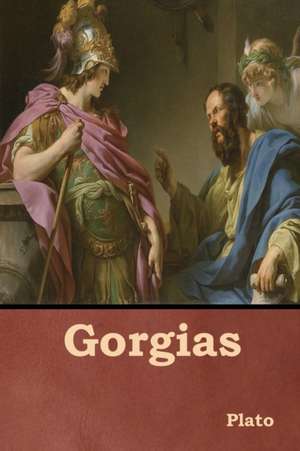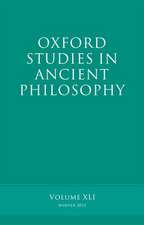Gorgias
Autor Platoen Limba Engleză Paperback – 4 iul 2019
He is widely considered the pivotal figure in the history of Ancient Greek and Western philosophy, along with his teacher, Socrates, and his most famous student, Aristotle. Plato has also often been cited as one of the founders of Western religion and spirituality. The so-called Neoplatonism of philosophers like Plotinus and Porphyry influenced Saint Augustine and thus Christianity. Alfred North Whitehead once noted: "the safest general characterization of the European philosophical tradition is that it consists of a series of footnotes to Plato."
Plato was the innovator of the written dialogue and dialectic forms in philosophy. Plato also appears to have been the founder of Western political philosophy. His most famous contribution bears his name, Platonism (also ambiguously called either Platonic realism or Platonic idealism), the doctrine of the Forms known by pure reason to provide a realist solution to the problem of universals. He is also the namesake of Platonic love and the Platonic solids.
Gorgias is a Socratic dialogue written by Plato around 380 BC. The dialogue depicts a conversation between Socrates and a small group of sophists (and other guests) at a dinner gathering. Socrates debates with the sophist seeking the true definition of rhetoric, attempting to pinpoint the essence of rhetoric and unveil the flaws of the sophistic oratory popular in Athens at the time. The art of persuasion was widely considered necessary for political and legal advantage in classical Athens, and rhetoricians promoted themselves as teachers of this fundamental skill. Some, like Gorgias, were foreigners attracted to Athens because of its reputation for intellectual and cultural sophistication. In the Gorgias, Socrates argues that philosophy is an art, whereas rhetoric is a skill based on mere experience. To Socrates, most rhetoric is in practice merely flattery. To use rhetoric for good, rhetoric cannot exist alone. It must depend on philosophy to guide its morality, he argues. Socrates therefore believes that morality is not inherent in rhetoric and that without philosophy, rhetoric is simply used to persuade for personal gain. Socrates suggests that he is one of the few Athenians to practice true politics (521d). (wikipedia.org)
| Toate formatele și edițiile | Preț | Express |
|---|---|---|
| Paperback (27) | 47.19 lei 10-16 zile | +16.06 lei 6-12 zile |
| OUP OXFORD – 17 apr 2008 | 47.19 lei 10-16 zile | +16.06 lei 6-12 zile |
| CREATESPACE – | 47.23 lei 22-36 zile | |
| CreateSpace Independent Publishing Platform – | 51.82 lei 22-36 zile | |
| Penguin Books – 28 ian 2004 | 54.84 lei 22-36 zile | +20.83 lei 6-12 zile |
| CreateSpace Independent Publishing Platform – | 62.40 lei 22-36 zile | |
| Hackett Publishing Company – 14 ian 1987 | 73.94 lei 22-36 zile | +14.21 lei 6-12 zile |
| CREATESPACE – | 76.79 lei 22-36 zile | |
| CREATESPACE – | 92.62 lei 22-36 zile | |
| Focus – 31 mar 2006 | 95.09 lei 22-36 zile | +19.66 lei 6-12 zile |
| Digireads.com – 15 iun 2019 | 58.72 lei 43-57 zile | |
| CreateSpace Independent Publishing Platform – | 60.05 lei 43-57 zile | |
| – | 62.54 lei 43-57 zile | |
| – | 67.47 lei 43-57 zile | |
| Watchmaker Publishing – 14 ian 2010 | 68.49 lei 43-57 zile | |
| Echo Library – 30 sep 2006 | 77.07 lei 38-44 zile | |
| Serenity Publishers, LLC – 30 sep 2008 | 79.66 lei 43-57 zile | |
| Binker North – 8 iun 2023 | 84.35 lei 43-57 zile | |
| Alpha Editions – 11 apr 2022 | 88.63 lei 43-57 zile | |
| Akasha Classics – 11 noi 2009 | 99.48 lei 43-57 zile | |
| Indoeuropeanpublishing.com – 4 iul 2019 | 100.96 lei 43-57 zile | |
| Binker North – 21 oct 2019 | 111.45 lei 38-44 zile | |
| 1st World Publishing – 30 sep 2008 | 112.18 lei 43-57 zile | |
| Book Jungle – 21 oct 2008 | 123.78 lei 43-57 zile | |
| CreateSpace Independent Publishing Platform – | 126.45 lei 43-57 zile | |
| TREDITION CLASSICS – 31 oct 2011 | 147.25 lei 43-57 zile | |
| Clarendon Press – mar 1990 | 235.50 lei 31-37 zile | |
| OUP OXFORD – 28 feb 1979 | 290.16 lei 31-37 zile | |
| Hardback (5) | 158.90 lei 43-57 zile | |
| 1st World Publishing – 30 sep 2008 | 158.90 lei 43-57 zile | |
| Binker North – sep 1878 | 166.52 lei 43-57 zile | |
| Akasha Classics – 11 noi 2009 | 181.78 lei 43-57 zile | |
| Indoeuropeanpublishing.com – 4 iul 2019 | 192.13 lei 43-57 zile | |
| Blurb – 22 mar 2023 | 192.60 lei 43-57 zile |
Preț: 100.96 lei
Nou
Puncte Express: 151
Preț estimativ în valută:
19.32€ • 20.22$ • 16.08£
19.32€ • 20.22$ • 16.08£
Carte tipărită la comandă
Livrare economică 31 martie-14 aprilie
Preluare comenzi: 021 569.72.76
Specificații
ISBN-13: 9781644392270
ISBN-10: 1644392275
Pagini: 158
Dimensiuni: 152 x 229 x 9 mm
Greutate: 0.24 kg
Editura: Indoeuropeanpublishing.com
ISBN-10: 1644392275
Pagini: 158
Dimensiuni: 152 x 229 x 9 mm
Greutate: 0.24 kg
Editura: Indoeuropeanpublishing.com
Notă biografică
Plato (428/427 or 424/423 - 348/347 BC) was an Athenian philosopher during the Classical period in Ancient Greece, founder of the Platonist school of thought, and the Academy, the first institution of higher learning in the Western world. He is widely considered the pivotal figure in the history of Ancient Greek and Western philosophy, along with his teacher, Socrates, and his most famous student, Aristotle.[a] Plato has also often been cited as one of the founders of Western religion and spirituality.[4] The so-called Neoplatonism of philosophers like Plotinus and Porphyry influenced Saint Augustine and thus Christianity. Alfred North Whitehead once noted: "the safest general characterization of the European philosophical tradition is that it consists of a series of footnotes to Plato."[5] Plato was the innovator of the written dialogue and dialectic forms in philosophy. Plato is also considered the founder of Western political philosophy. His most famous contribution is the theory of Forms known by pure reason, in which Plato presents a solution to the problem of universals known as Platonism (also ambiguously called either Platonic realism or Platonic idealism). He is also the namesake of Platonic love and the Platonic solids. His own most decisive philosophical influences are usually thought to have been along with Socrates, the pre-Socratics Pythagoras, Heraclitus and Parmenides, although few of his predecessors' works remain extant and much of what we know about these figures today derives from Plato himself.[b] Unlike the work of nearly all of his contemporaries, Plato's entire body of work is believed to have survived intact for over 2,400 years.[7] Although their popularity has fluctuated over the years, the works of Plato have never been without readers since the time they were written
Descriere
Descriere de la o altă ediție sau format:
The struggle which Plato has Socrates recommend to his interlocutors in Gorgias - and to his readers - is the struggle to overcome the temptations of worldly success and to concentrate on genuine morality. Ostensibly an enquiry into the value of rhetoric, the dialogue soon becomes an investigation into the value of these two contrasting ways of life. In a series of dazzling and bold arguments, Plato attempts to establish that only morality can bring a person true happiness, and to demolish alternative viewpoints. It is not suprising that Gorgias is one of Plato's most widely read dialogues. Philosophers read it for its coverage of central moral issues; others enjoy its vividness, clarity and occasional bitter humour. This new translation is accompanied by explanatory notes and an informative introduction. ABOUT THE SERIES: For over 100 years Oxford World's Classics has made available the widest range of literature from around the globe. Each affordable volume reflects Oxford's commitment to scholarship, providing the most accurate text plus a wealth of other valuable features, including expert introductions by leading authorities, helpful notes to clarify the text, up-to-date bibliographies for further study, and much more.
The struggle which Plato has Socrates recommend to his interlocutors in Gorgias - and to his readers - is the struggle to overcome the temptations of worldly success and to concentrate on genuine morality. Ostensibly an enquiry into the value of rhetoric, the dialogue soon becomes an investigation into the value of these two contrasting ways of life. In a series of dazzling and bold arguments, Plato attempts to establish that only morality can bring a person true happiness, and to demolish alternative viewpoints. It is not suprising that Gorgias is one of Plato's most widely read dialogues. Philosophers read it for its coverage of central moral issues; others enjoy its vividness, clarity and occasional bitter humour. This new translation is accompanied by explanatory notes and an informative introduction. ABOUT THE SERIES: For over 100 years Oxford World's Classics has made available the widest range of literature from around the globe. Each affordable volume reflects Oxford's commitment to scholarship, providing the most accurate text plus a wealth of other valuable features, including expert introductions by leading authorities, helpful notes to clarify the text, up-to-date bibliographies for further study, and much more.
Cuprins
GorgiasAcknowledgments
Reference System Used in this Edition
Chronolgy
Introduction
Further Reading
A Note on the Text
Reference System Used in this Edition
Chronolgy
Introduction
Further Reading
A Note on the Text
Gorgias
A: Dialogue with Gorgias
B: Dialogue with Polus
C: Dialogue with Callicles
Notes
Glossary of Greek Terms
Index
Recenzii
`Professor Dodds's fine edition (which both fairly overhauls the manuscript tradition and supplies a commentary as wide-ranging as it is perspicacious) fills a gap untouched in this country since 1890 ... The Gorgias should have a special appeal to contemporary students, and to historians no less than philosophers.'Times Literary Supplement`The admired qualities of [Dodd's works], a scholarship both exact and deep, an economy and lucidity in exposition (Dodds has few rivals in saying much in the fewest words with absolute clarity), and an immense level-headedness and sobriety which - combined with the sharpest acumen and independence of judgement in the handling of evidence - is never seduced by the charm of fantasy, all these once more characterize his edition of the Gorgias.'Philosophical Quarterly












